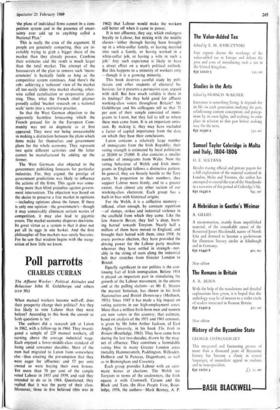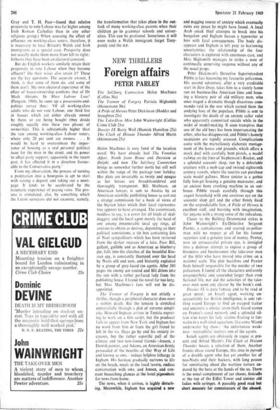Poll parrott,s -
CHARLES CURRAN
When manual workers become well-off, does their prosperity change their politics? Are they less likely to vote Labour than they were before? According to this book the answar to both questions is 'no.'
The authors did a research job at Luton in 1962, with a follow-up in 1964. They investi- gated a sample of 229 manual workers, all earning above the average industrial wage. Each enjoyed a lower-middle-class standard of Jiving amid consumer durables. Most of the men bad migrated to Luton from somewhere else—thus creating the presumption that they were eager for affluence; and 57 per cent, owned or were buying their own houses. Yet more than 70 per cent of the sample voted Labour in 1955 and 1959, and said they intended to do so in 1964. Questioned, they replied that it was the party of their class. Moreover, three in five believed (this was in 1962) that Labour would make the workers still better off when it came to power.
It is not affluence, they say, which endangers loyalty to Labour, but mixing with the middle classes—`either through having been brought up in a white-collar family, or having married into such a family, or having worked in a white-collar job, or having a wife in such a job.' Any such experience is likely to have a direct effect on a man's political outlook. But this happens to a minority of workers only —though it is a growing minority.
This book deserves careful study by poli- ticians and other students of electoral be-
haviour, for it presents a persuasive case, argued with skill. But how much validity is there in its findings? Do they hold good for affluent working-class voters throughout Britain? Mr Goldthorpe and his colleagues tell us that 71 per cent of their sample consisted of immi- grants to Luton, but they fail to tell us where these men came from. It is an important omis- sion. By making it, they may have excluded a factor of capital importance from the data on which they base their conclusions.
Luton contains a relatively large number of immigrants from the Irish Republic; their voting strength is estimated by local politicians at 20,000 to 25,000. It also contains a smaller number of immigrants from Wales. Now the voting behaviour of Welsh and Irish immi- grants in England follows a distinctive pattern. In general, they are fiercely hostile to the Tory party. In proportion to their numbers, they support Labour more firmly, and to a greater extent, than almost any other section of our working-class electorate. Each group has a built-in bias with historical origins.
For the Welsh, it is a collective memory— inflated, often enough, by constant repetition —of slumps, strikes and industrial violence in the coalfield from which they came. Like the late Aneurin Bevan, they feel 'a deep, burn- ing hatred' towards Toryism. Nearly half a million of them have moved to England, and brought their hatred with them, since 1918. At every postwar election, they have provided the driving power for the Labour party machine wherever they have settled in "strength—not- ably in the string of seats along the industrial belt that stretches from Greater London to Bristol.
Equally significant in our politics is the con- tinuing fact of Irish immigration. Before 1914 it played an important part in stimulating the growth of the Labour movement, in the unions and at the polling stations—as, Mr E. Strauss the marxist historian, has shown in his Irish Nationalism and British Democracy (Methuen, 1951). Since 1945' it has made a big impact on voting patterns in our high-employment areas. More than a million Irish-born men and women are now voters in this country; that estimate, based on analysis of the 1951 and 1961 censuses, is given by Mr John Arthur Jackson, of East Anglia University, in his book The Irish in Britain (Routledge, 1963). They have come here during the last two decades, drawn by the mag- net of affluence. They constitute a formidable voting bloc in many Greater London areas (notably Hammersmith, Paddington, Willesden, Holborn and St Pancras, Dagenham), as well as in Birmingham and Coventry.
Each group provides Labour with an auto- matic bonus at elections. The Welsh see Toryism in terms of the coalowners, the Irish equate it with Cromwell, Carson and the Black and Tans. (In How People Vote, Rout- ledge, 1956, the authors—Mark Benney, A. P. Gray and T. H. Pear—found that relative propensity to vote Labour was far higher among Irish Roman Catholics than in any other religious group.) When assessing the effect of affluence on working-class voters, therefore, it is necessary to treat Britain's Welsh and Irish immigrants as a special case. Prosperity does not usually make them move from left to right: hitherto they have been an electoral constant.
But do English workers similarly retain- their propensity to vote Labour when they become affluent? Do their wives also retain it? These are the key questions. The accurate answer, I think, is that some of them do, and some of them don't. My own electoral experience of the effect of house-ownership confirms that of Dr Mark Abrams. In Must Labour Lose? (Penguin, 1960), he sums up a possessions-and- politics survey thus: Of all working-class adults who do not vote Labour, one third live in houses which are either already owned by them, or are being bought (they divide roughly equally into these two phases of ownership). This is substantially higher than the rate among working-class Labour voters, where only 20 per cent are owners . . . It would be hard to overestimate the impor- tance of housing as a real personal political issue for the man in the street, and its power to affect party support; apparently in the recent past, it has affected it in a direction favour- able to the Conservative party.'
From my observation, the process of turning a proletarian into a bourgeois is apt to start with raising a deposit and taking out a mort- gage. It tends to be accelerated by the traumatic experience of paying rates. The pro- cess is stimulated, also, by something which the Luton surveyors did not examine, namely,
the transformation that takes place in the out- look of many working-class parents when their children go to grammar schools and univer- sities. This can be profound. Sometimes it will even make a Welsh immigrant forget Tony- pandy and the ILP.



































 Previous page
Previous page